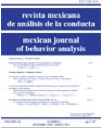BEHAVIORAL HISTORY AND THE DELA y OF REINFORCEMENT GRADIENT
Main Article Content
Abstract
In the absence of shaping or otherwise explicitly training lever pressing, six rats were directly exposed to a tandem random-interval 30-s fixed time t-s schedule. This schedule defined an unsignaled, non-resetting delay of reinforcement procedure in which the delay (the fixed time component of the schedule) was either O, 3, 6, 12, or 24 s long. Three rats were exposed to the delays in ascending order (O to 24 s) and three others were exposed to the delays in descending order. Each delay was in effect for 20 sessions. Lever pressing was acquired by all six rats regardless of whether the O-s or the 24-s delay initially was in effect. Response rates generally were higher when delays were shorter. Rats exposed to the delays in an ascending order responded at higher rates at each delay value than did rats exposed to the delays in a descending order. Such results show how past experience influences the delay of reinforcement gradient and suggest that the concept of an absolute delay of reinforcement gradient is untenable.
